| Listing 1 - 10 of 12 | << page >> |
Sort by
|
Book
ISBN: 9780226702759 9780226702735 0226702731 0226702758 Year: 2008 Publisher: Chicago : University of Chicago Press,
Abstract | Keywords | Export | Availability | Bookmark
 Loading...
Loading...Choose an application
- Reference Manager
- EndNote
- RefWorks (Direct export to RefWorks)
Methods in social research (general) --- Social sciences --- Fuzzy sets --- Research --- Methodology --- Fuzzy sets. --- #SBIB:303H32 --- #SBIB:303H12 --- kwantitatieve methoden --- maatschappijwetenschappen, methoden --- Sets, Fuzzy --- Fuzzy mathematics --- Set theory --- Methodology. --- Waarneming en participerende waarneming, gecontroleerde observatie, groepsdiscussie (vragenlijsten, interviews, experimenten) --- Methoden en technieken: sociale wetenschappen --- Behavioral sciences --- Human sciences --- Sciences, Social --- Social science --- Social studies --- Civilization --- Research&delete& --- Social sciences - Research - Methodology
Book
ISBN: 0201117525 Year: 1986 Publisher: Reading, Mass. : Addison-Wesley,
Abstract | Keywords | Export | Availability | Bookmark
 Loading...
Loading...Choose an application
- Reference Manager
- EndNote
- RefWorks (Direct export to RefWorks)
Analytical topology --- Fuzzy sets. --- Fuzzy systems. --- 510.22 --- Fuzzy sets --- Fuzzy systems --- Systems, Fuzzy --- System analysis --- Fuzzy logic --- Sets, Fuzzy --- Fuzzy mathematics --- Set theory --- Set theory. Set theoretic approach. Theory of order types, of ordinal and cardinal numbers --- 510.22 Set theory. Set theoretic approach. Theory of order types, of ordinal and cardinal numbers --- Ensembles flous --- Logique floue --- Systèmes flous
Book
ISBN: 0124023010 9780124023017 Year: 1975 Publisher: New York (N.Y.): Academic press
Abstract | Keywords | Export | Availability | Bookmark
 Loading...
Loading...Choose an application
- Reference Manager
- EndNote
- RefWorks (Direct export to RefWorks)
Mathematical logic --- Mathématique --- Graphes --- Fuzzy sets --- Set theory --- 510.22 --- Sets, Fuzzy --- Fuzzy mathematics --- Set theory. Set theoretic approach. Theory of order types, of ordinal and cardinal numbers --- Fuzzy sets. --- 510.22 Set theory. Set theoretic approach. Theory of order types, of ordinal and cardinal numbers --- Mathématiques
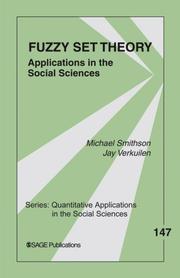
ISBN: 076192986X 9780761929864 1412984300 1441628169 1452212414 Year: 2006 Volume: 147 Publisher: Thousand Oaks Sage
Abstract | Keywords | Export | Availability | Bookmark
 Loading...
Loading...Choose an application
- Reference Manager
- EndNote
- RefWorks (Direct export to RefWorks)
This book introduces fuzzy set theory to social science researchers. Fuzzy sets are categories with blurred boundaries. With classical sets, objects are either in the set or not, but objects can belong partially to more than one fuzzy set at a time. Many concepts in the social sciences have this characteristic, and fuzzy set theory provides methods for systematically dealing with them. A primary reason for not going beyond programmatic statements and rather unsophisticated uses of fuzzy set theory has been the lack of practical methods for combining fuzzy set concepts with statistical methods. This monograph takes that topic as its major focus, and provides explicit guides for researchers who would like to harness fuzzy set concepts while being able to make statistical inferences and test their models. Real examples and data-sets from several disciplines illustrate the techniques and applications, demonstrating how a combination of fuzzy sets and statistics enable researchers to analyze their data in new ways.
Mathematical logic --- MATHEMATICS --- Set Theory --- Social sciences --- Fuzzy sets --- Social Sciences - General --- Social Sciences --- Mathematics --- Fuzzy sets. --- Mathematics. --- #SBIB:303H10 --- kwantitatieve methoden --- maatschappijwetenschappen, methoden --- operations research --- Methoden en technieken: algemene handboeken en reeksen --- Sciences sociales --- Ensembles flous --- Mathématiques --- Sets, Fuzzy --- Fuzzy mathematics --- Set theory --- Social sciences - Mathematics
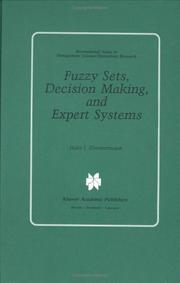
ISBN: 0898381495 9401079579 9400932499 9780898381498 Year: 1987 Publisher: Boston (Mass.) : Kluwer academic,
Abstract | Keywords | Export | Availability | Bookmark
 Loading...
Loading...Choose an application
- Reference Manager
- EndNote
- RefWorks (Direct export to RefWorks)
Operational research. Game theory --- Statistical decision --- Fuzzy sets --- Expert systems (Computer science) --- 519.226 --- Decision problems --- Game theory --- Operations research --- Statistics --- Management science --- Inference and decision theory. Likelihood. Bayesian theory. Fiducial probability --- Fuzzy sets. --- Statistical decision. --- Expert systems (Computer science). --- 519.226 Inference and decision theory. Likelihood. Bayesian theory. Fiducial probability --- Systèmes experts (Informatique) --- Ensembles flous --- Prise de décision (Statistique) --- Knowledge-based systems (Computer science) --- Systems, Expert (Computer science) --- Artificial intelligence --- Computer systems --- Soft computing --- Sets, Fuzzy --- Fuzzy mathematics --- Set theory
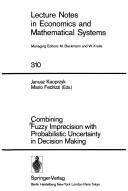
ISBN: 3540500057 0387500057 3642466443 Year: 1988 Volume: 310 Publisher: Berlin Springer
Abstract | Keywords | Export | Availability | Bookmark
 Loading...
Loading...Choose an application
- Reference Manager
- EndNote
- RefWorks (Direct export to RefWorks)
In the literature of decision analysis it is traditional to rely on the tools provided by probability theory to deal with problems in which uncertainty plays a substantive role. In recent years, however, it has become increasingly clear that uncertainty is a mul tifaceted concept in which some of the important facets do not lend themselves to analysis by probability-based methods. One such facet is that of fuzzy imprecision, which is associated with the use of fuzzy predicates exemplified by small, large, fast, near, likely, etc. To be more specific, consider a proposition such as "It is very unlikely that the price of oil will decline sharply in the near future," in which the italicized words play the role of fuzzy predicates. The question is: How can one express the mean ing of this proposition through the use of probability-based methods? If this cannot be done effectively in a probabilistic framework, then how can one employ the information provided by the proposition in question to bear on a decision relating to an investment in a company engaged in exploration and marketing of oil? As another example, consider a collection of rules of the form "If X is Ai then Y is B,," j = 1, . . . , n, in which X and Yare real-valued variables and Ai and Bi are fuzzy numbers exemplified by small, large, not very small, close to 5, etc.
Probability theory --- Statistical decision --- Fuzzy sets --- Uncertainty (Information theory) --- Prise de décision (Statistique) --- Ensembles flous --- Incertitude (Théorie de l'information) --- Management --- Business & Economics --- Management Theory --- 519.226 --- Decision problems --- Game theory --- Operations research --- Statistics --- Management science --- Sets, Fuzzy --- Fuzzy mathematics --- Set theory --- Inference and decision theory. Likelihood. Bayesian theory. Fiducial probability --- Fuzzy sets. --- Statistical decision. --- 519.226 Inference and decision theory. Likelihood. Bayesian theory. Fiducial probability --- Prise de décision (Statistique) --- Incertitude (Théorie de l'information)
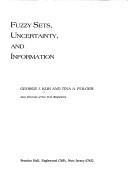
ISBN: 0133456382 0133459845 9780133459845 9780133456387 Year: 1988 Publisher: Englewood Cliffs, NJ : Prentice-Hall International,
Abstract | Keywords | Export | Availability | Bookmark
 Loading...
Loading...Choose an application
- Reference Manager
- EndNote
- RefWorks (Direct export to RefWorks)
Ergodic theory. Information theory --- Mathematical control systems --- Documentation and information --- Fuzzy sets --- Fuzzy systems --- System analysis --- wiskundige statistiek --- 681.5:510.6 --- algebra --- fuzzy logic --- informatietheorie --- kunstmatige intelligentie --- regeltechniek --- statistiek --- stochastische variabelen --- systeemherkenning --- vage besluitvorming --- vage bewerkingen --- vage relaties --- vage verzamelingen --- wiskunde --- Network theory --- Systems analysis --- System theory --- Mathematical optimization --- Systems, Fuzzy --- Fuzzy logic --- Sets, Fuzzy --- Fuzzy mathematics --- Set theory --- Network analysis --- Network science --- System analysis. --- Fuzzy sets. --- Fuzzy systems. --- Ensembles flous --- Logique floue --- Information, Théorie de l'
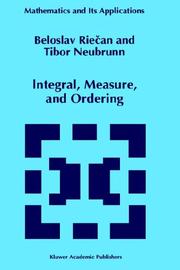
ISBN: 0792345665 9048148553 9401589194 Year: 1997 Publisher: Dordrecht Kluwer Academic
Abstract | Keywords | Export | Availability | Bookmark
 Loading...
Loading...Choose an application
- Reference Manager
- EndNote
- RefWorks (Direct export to RefWorks)
The present book is a monograph including some recent results of mea sure and integration theory. It concerns three main ideas. The first idea deals with some ordering structures such as Riesz spaces and lattice or dered groups, and their relation to measure and integration theory. The second is the idea of fuzzy sets, quite new in general, and in measure theory particularly. The third area concerns some models of quantum mechanical systems. We study mainly models based on fuzzy set theory. Some recent results are systematically presented along with our suggestions for further development. The first chapter has an introductory character, where we present basic definitions and notations. Simultaneously, this chapter can be regarded as an elementary introduction to fuzzy set theory. Chapter 2 contains an original approach to the convergence of sequences of measurable functions. While the notion of a null set can be determined uniquely, the notion of a set of "small" measure has a fuzzy character. It is interesting that the notion of fuzzy set and the notion of a set of small measure (described mathematically by so-called small systems) were introduced independently at almost the same time. Although the axiomatic systems in both theories mentioned are quite different, we show that the notion of a small system can be considered from the point of view of fuzzy sets.
Measure theory. Mathematical integration --- Fuzzy sets. --- Integrals, Generalized. --- Measure theory. --- Mathematical logic. --- Probabilities. --- Algebra. --- Ordered algebraic structures. --- Applied mathematics. --- Engineering mathematics. --- Measure and Integration. --- Mathematical Logic and Foundations. --- Probability Theory and Stochastic Processes. --- Order, Lattices, Ordered Algebraic Structures. --- Applications of Mathematics. --- Engineering --- Engineering analysis --- Mathematical analysis --- Algebraic structures, Ordered --- Structures, Ordered algebraic --- Algebra --- Mathematics --- Probability --- Statistical inference --- Combinations --- Chance --- Least squares --- Mathematical statistics --- Risk --- Algebra of logic --- Logic, Universal --- Mathematical logic --- Symbolic and mathematical logic --- Symbolic logic --- Algebra, Abstract --- Metamathematics --- Set theory --- Syllogism --- Lebesgue measure --- Measurable sets --- Measure of a set --- Algebraic topology --- Integrals, Generalized --- Measure algebras --- Rings (Algebra) --- Calculus, Integral --- Sets, Fuzzy --- Fuzzy mathematics
Book
ISBN: 1858982065 Year: 1995 Publisher: Aldershot Elgar
Abstract | Keywords | Export | Availability | Bookmark
 Loading...
Loading...Choose an application
- Reference Manager
- EndNote
- RefWorks (Direct export to RefWorks)
Operational research. Game theory --- Mathematical logic --- Economics --- 338.516 --- Fuzzy sets --- Oligopolies --- -681.3*I51 --- Economic concentration --- Monopolies, Partial --- Partial monopolies --- Competition, Imperfect --- Interorganizational relations --- Sets, Fuzzy --- Fuzzy mathematics --- Set theory --- Markt als prijsmechanisme. Marktmechanisme. Marktprijs. Vrije concurrentie. Monopolistische concurrentie. Oligipolie. Duopolie. Marginale prijsvorming --groothandel-kleinhandelprijs zie {339.3} --- Mathematical models --- Models: deterministic; fuzzy set; geometric; statistical; structural (Patternrecognition) --- Fuzzy sets. --- Mathematical models. --- 681.3*I51 Models: deterministic; fuzzy set; geometric; statistical; structural (Patternrecognition) --- 338.516 Markt als prijsmechanisme. Marktmechanisme. Marktprijs. Vrije concurrentie. Monopolistische concurrentie. Oligipolie. Duopolie. Marginale prijsvorming --groothandel-kleinhandelprijs zie {339.3} --- 681.3*I51

ISBN: 0226702766 0226702774 9780226702766 9780226702773 Year: 2000 Publisher: Chicago University of Chicago press
Abstract | Keywords | Export | Availability | Bookmark
 Loading...
Loading...Choose an application
- Reference Manager
- EndNote
- RefWorks (Direct export to RefWorks)
Social sciences --- Fuzzy sets --- Sciences sociales --- Ensembles flous --- Research --- Recherche --- -Fuzzy sets --- #SBIB:303H12 --- #SBIB:303H10 --- 164 --- 3.01 --- 518.5 --- maatschappijwetenschappen, methoden --- kwantitatieve methoden --- 303 --- Sets, Fuzzy --- Fuzzy mathematics --- Set theory --- Behavioral sciences --- Human sciences --- Sciences, Social --- Social science --- Social studies --- Civilization --- Methoden en technieken: sociale wetenschappen --- Methoden en technieken: algemene handboeken en reeksen --- Mathematische logica --- Sociale wetenschappen (algemeen) --- Operationeel onderzoek. Speltheorie --- Methoden bij sociaalwetenschappelijk onderzoek --- Fuzzy sets. --- Research. --- 303 Methoden bij sociaalwetenschappelijk onderzoek --- Social science research --- Mathematical logic --- Political philosophy. Social philosophy --- sociaal-wetenschappelijk onderzoek --- Methods in social research (general) --- Social sciences - Research
| Listing 1 - 10 of 12 | << page >> |
Sort by
|

 Search
Search Feedback
Feedback About
About Help
Help News
News